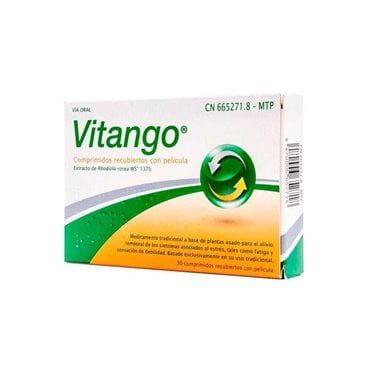Vitango 200 Mg 30 Coated Tablets
Vitango is a traditional herbal medicine used for the temporary relief of symptoms associated with stress, such as fatigue and feelings of weakness. Based exclusively on its traditional use.
Vitango is a traditional herbal medicine used for the temporary relief of symptoms associated with stress, such as fatigue and feelings of weakness. Based exclusively on its traditional use.
Vitango (200 Mg 30 Coated Tablets)
INDICATIONS
- Relief of symptoms associated with [STRESS] and excessive work, such as fatigue, exhaustion and irritability.
Its use is based exclusively on traditional use.
POSOLOGY
- Adults, oral: 2 tablets daily, administered with breakfast and lunch. Maximum duration 2 months.
- Children and adolescents under 18 years of age, oral: Safety and efficacy have not been evaluated.
RULES FOR CORRECT ADMINISTRATION
Take the tablets whole, half an hour before breakfast and lunch.
ADVICE TO THE PATIENT
- Take half an hour before breakfast and lunch.
- Treatment will last for a maximum of 2 months.
CONTRAINDICATIONS
- Hypersensitivity to rhodiola or any component of the medication.
- Patients with [KIDNEY FAILURE] or [LIVER FAILURE]. Safety and efficacy have not been evaluated.
PREGNANCY
There are no adequate and well-controlled studies in pregnant women, so the use of rhodiola during pregnancy is only accepted in the event that there are no safer therapeutic alternatives, the benefits outweigh the possible risks.
LACTATION
It is unknown whether the components of rhodiola are excreted with breast milk, and the possible consequences this could have for the infant. It is advisable to stop breastfeeding or avoid its use during breastfeeding.
CHILDREN
Safety and efficacy have not been evaluated in children and adolescents under 18 years of age, so it is recommended to avoid its use.
ADVANCED AGE
No specific problems have been described in the elderly.
ADVERSE REACTIONS
- Allergic. [HYPERSENSITIVITY REACTIONS].
- Metabolic. [HYPOGLYCEMIA].
However, a causal relationship has not been established.
OVERDOSE
Symptoms: There is no clinical experience with rhodiola overdose.
Treatment: Symptomatic treatment will be instituted.
In case of overdose or accidental ingestion, go to a medical center or consult the Toxicological Information Service, indicating the product and the amount ingested.



